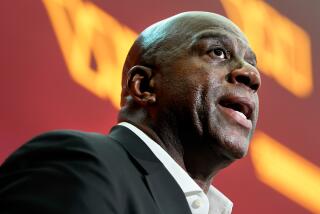Winning Streak Ends for RJR’s Johnson
- Share via
F. Ross Johnson, chief executive of RJR Nabisco, seemed the consummate can-do manager.
A fashionable dresser who enjoys the company of sports figures, he bought and sold companies, launched new products and killed others without agonizing. In a career of corporate deal making, he had an uncanny ability to end up on top.
He did, that is, until earlier this week, when an investment group led by the Canada native, 56, lost a bid to buy the Atlanta-based food and tobacco giant.
RJR Nabisco’s future owners say they plan to dump Johnson, probably next year. When he goes, the flamboyant manager will take with him millions of dollars in benefits--and the stigma of launching the most criticized buyout in history, one that landed him on the cover of Time magazine as a symbol of greed.
“Time has run out on Ross Johnson,” said analyst Roy Burry of Kidder, Peabody and Co., declaring Johnson the loser in the most spectacular corporate bidding war in history.
His exit may be cushioned, however, by severance payments and his ownership of RJR stock worth $25.7 million under the winning bid of $109 per share. As of last March, Johnson owned 235,535 shares.
Nonetheless, instead of pulling off the master stroke of his career, it appears that Johnson has caused his own exit from the company, the wholesale unloading of many RJR Nabisco products to competing firms and the temporary resurrection of a retired executive to help calm the storm.
“He’s obviously a mercurial kind of guy,” said a source at a competing tobacco company. “It looks like twice in the last year he did some hip-shooting and got caught at it.”
According to the source, the first example of “hip-shooting” was RJR Nabisco’s hasty introduction of Premier, a smokeless cigarette designed not to offend non-smokers, into test markets earlier this year. The product, which heats tobacco rather than burns it, has run into regulatory problems with the federal government and has been panned by consumers.
But the much larger cause celebre was Johnson’s announcement in October that he and other top executives sought to buy their own company from stockholders for $17 billion.
RJR Nabisco board members learned only later that Johnson and other company executives could gain hundreds of millions of dollars in profits under their proposal. Rather than going along with their chief executive, board members asked for rival offers. The ensuing free-for-all sparked a national debate over the financial maneuverings of corporate America.
Johnson’s involvement in the process became increasingly controversial because, as chief executive, he is required to strive for the greatest value to shareholders, not the best deal for himself. Ultimately, the winning $24.5-billion bid was made not by Johnson but by the investment firm of Kohlberg Kravis Roberts & Co.
To the extent that Johnson wished to end bidding with his initial $17-billion offer--something that is not known--”there was a very serious conflict of interest there,” said Louis Lowenstein, professor of finance and law at Columbia University and author of the 1988 book “What’s Wrong With Wall Street.”
Return of an Old Hand
After board members announced the Kohlberg Kravis Roberts victory, the Johnson team--which included Shearson Lehman Hutton and Salomon Bros.--hinted of a continuing challenge for control of the company. Later on Thursday, however, Johnson sounded more conciliatory, revealing that he promised Kravis that he would work “toward a professional and smooth transition” if the Kravis group takes over, as planned.
As part of the transition, Kohlberg Kravis Roberts plans to bring back J. Paul Sticht, a former chief executive of RJR Nabisco, to serve in that role temporarily. Kohlberg Kravis Roberts wrote members of a special RJR Nabisco committee earlier this month that “it is not our intention” to offer jobs to Johnson and his allies.
It is not the first time that Sticht, 70, has been asked to help stabilize RJR Nabisco.
In early 1987, a period when some of Johnson’s management changes were rocking the company, board members invited Sticht to return temporarily as chairman. “When the alligators are in the boat, he makes you feel very calm, keeps his hand on the tiller and the boat on course,” an RJR Nabisco executive remarked at the time.
Another tobacco industry source described Sticht as a member of RJR Nabisco’s old guard, “a tobacco man,” whereas “to the folks in that business, Johnson is a cookie man.”
Johnson also has been dubbed a greedy man by many observers. His failed buyout is hardly the first ever attempted, but it stood out by its magnitude and the size of gains possible for the top managers, estimated by some to reach $2.6 billion.
In one of their first moves, the victorious bidders reportedly plan to reverse a Johnson decision and return RJR Nabisco’s headquarters to Winston-Salem, N.C., from Atlanta.
Efforts to reach RJR Nabisco executives Thursday were unsuccessful. But in a recent interview with Time magazine, Johnson, whose personal portion of the profits might have been as much as $1 billion under his failed bid, said he planned to share the profits with 15,000 company employees.
“When you think about it, Johnson has done a good job for them,” said Neal Kaplan, an analyst with Interstate/Johnson Lane in Charlotte, N.C., who credits Johnson with nearly doubling the stock price from the start of the bidding war.
Kaplan described the controversial chief executive as “talented, arrogant, competent, tough--and successful. He’s been taken over a couple times and ended up in the top position. That’s a pretty nice talent.”
Kaplan was referring to two previous situations--once, when Johnson was head of Standard Brands, which was taken over by Nabisco, and more recently when Nabisco was taken over by R.J. Reynolds. In each case, he seemed to beat the odds and emerge as chief executive after the merger.
Debt May Be Huge
While it appears that Johnson’s third merger may not prove charmed, he nonetheless stands to survive in comfortable shape. According to documents filed with the Securities and Exchange Commission, the executive received $1.73 million in salary and bonuses for 1987.
His severance arrangement or “golden parachute” guarantees that he be paid through 1991, at which time he becomes eligible for retirement benefits.
On the minus side, Johnson’s losing team may owe banks and attorneys an undisclosed sum of fees related to the bid, which according to some observers could easily exceed $1 million.
According to one source close to the transaction, Kohlberg Kravis Roberts on Thursday asked the special committee whether the company would compensate Johnson for the fees. The special committee knew of no such agreement, the source related.
In any case, as analyst Kaplan pointed out, “If he (Johnson) walks away with millions of dollars, it’s hard to say he lost a lot.”
More to Read
Inside the business of entertainment
The Wide Shot brings you news, analysis and insights on everything from streaming wars to production — and what it all means for the future.
You may occasionally receive promotional content from the Los Angeles Times.










